#JournosAgainstShutdowns
Campaign Against Internet Shutdowns in South Asia
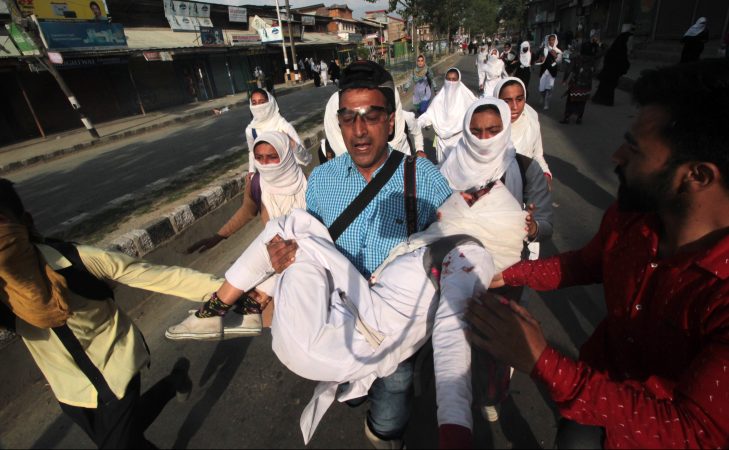
On assignment covering clashes in Srinagar in April 2017, photojournalist Dar Yasin put aside his camera to rush an injured school girl to hospital. On April 26, the government of Jammu and Kashmir announced a ban on social media sites and apps including Facebook, Whatsapp and Twitter in Kashmir on the grounds that these were being misused by anti-national and anti-social elements to fan trouble. The ban will be in place for at least one month or until further notice. Credit: Faisal Khan
Internet shutdowns are increasing around the world.
In 2016, South Asia experienced the highest number of internet shutdowns globally.
India leads on the number of shutdowns, followed by Pakistan and Bangladesh. As well as causing massive economic losses, internet shutdowns also bring many adverse social impacts access to vital information; and crisis communication with friends and family. When the internet gets blocked or social media is shut down, many journalists lose a valuable research, verification and communication tool. This can delay reporting on critical issues like human rights abuses and means that journalists may have to travel long distances to get and report information. Internet shutdown is also a way of censorship.
Internet shutdowns prevent journalists from freely reporting, and citizens from sharing and accessing information. It means they do not have access to media sources and information. They face difficulties in producing and filing stories. Deliberate internet shutdowns pose a threat to human rights and block the public’s right to know. They harm journalists, human rights defenders, businesses, emergency services and demonstrators.
Why internet shutdowns a bad idea!
| BECAUSE INTERNET SHUTDOWNS:
1. Restrict freedom of expression, including press freedom |
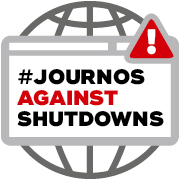 |
Right now in South Asia:
- Journalists need to develop a shared understanding of the impact of shutdowns on their profession and duties.
- Every journalist should monitor and report internet shutdowns as a violation of journalism rights.
- All media must advocate against shutdowns in the public interest and as a freedom of expression violation.
Act Now! Join the Campaign!
- Sign your organisation on to the #KeepItOn Coalition by clicking Add Your Organization here
- Share your opinion and graphics using Facebook or Twitter or other social media platform using #JournosAgainstShutdowns hashtag. You may also share facts and quotes from here.
- Fight internet shutdowns: here are things that journalists can do.
- Report internet shutdowns to IFJ / SAMSN using this form.
 |
– What is an internet shutdown? |
Why is SAMSN campaigning against shutdowns?
South Asia is at the critical juncture when it comes to freedom of expression online. While there is massive increase in numbers of users and access to internet, this has been countered with increasing curbs on the freedom of expression in the digital space.
Internet shutdowns have been identified as a major issue in 2016 by the South Asia Media Solidarity Network (SAMSN) and the International Federation of Journalists in its reports, New Fronts, Brave Voices: Press Freedom in South Asia 2016-2017 and Breaking the Walls: The fight for freedom of expression in the digital space in South Asia.
Many shutdowns are driven by political considerations and many of them have been imposed with no clear legal mandate. The first casualty is freedom of expression.
Journalists and media are hampered in many ways, most critically in their role in supporting and promoting democracy and freedom of expression. That’s why there is an urgent need for journalists, their unions and media rights organizations in the region to join the growing advocacy against internet shutdowns in order to defend the rights of journalists and freedom of expression in South Asia.
Campaign videos by SAMSN members
| See all campaign videos here | |
Campaign Resources
Use this graphic on social media and make a statement against shutdowns in South Asia. Logos in many other South Asian languages are here.
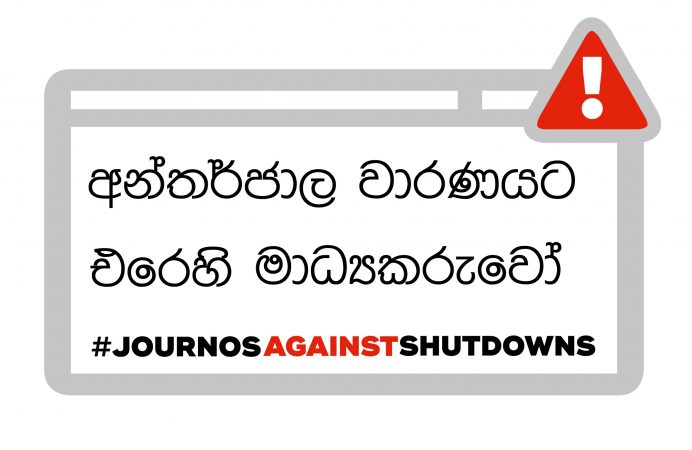 Download Sinhala Download Sinhala |
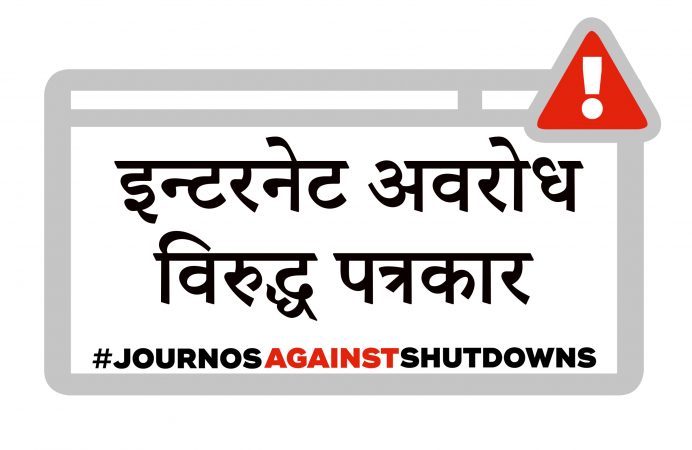 Download Nepali Download Nepali |
- Facts and quotes about internet shutdowns (they could be shared as social media posts and tweets).
 Click on the card to download it |
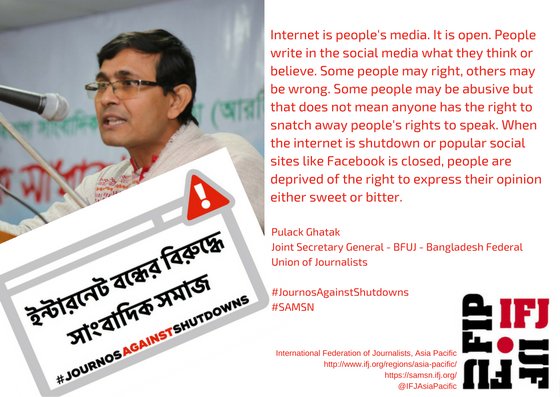 Click on the card to download it |
- Send your quote against internet shutdown here.
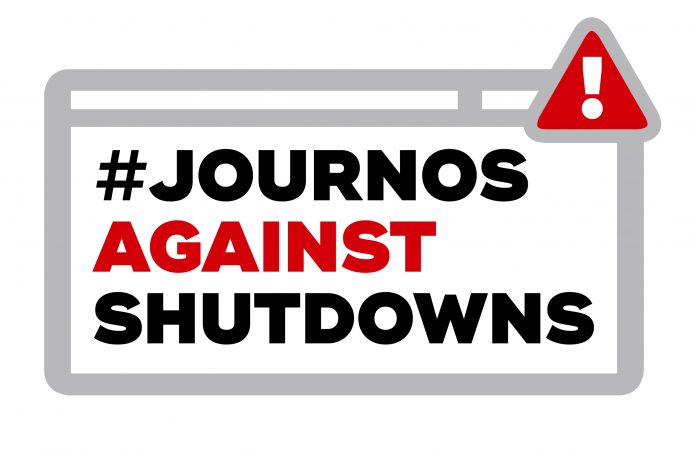
Blogs
- #JournosAgainstShutdowns: A South Asian ConversationA Google Hangout by IFJ Asia Pacific
Crucial linkby Ujjwal Acharya (Nepal)
The New Normal Of Living With No Internet In Kashmirby Arshie Qureshi (India)
Invisible barsby Sam Jahan (Bangladesh)
Royal Kill-Switchinterview with Prateek Pradhan (Nepal)
E-curfews: Killing hope in Kashmirby Faisul Yaseen (Kashmir, India)
Internet: Oxygen for Journalismby Saadullah Akhter (Balochistan, Pakistan)
Shutdown trackers
Reports
- New Fronts, Brave Voices: Press Freedom in South Asia 2016-2017 (IFJ)
Breaking the Walls: The fight for freedom of expression in the digital space in South Asia (IFJ)
Anatomy of Virtual Curfews: Human Rights vs National Security (DEF)
Internet shutdowns cost countries $2.4 billion last year (The Brookings Institution)
The Economic Impact of Disruptions to Internet Connectivity (GNI)
Internet Shutdowns in 2016 (CIS - India)
Security v Access: The Impact of Mobile Network Shutdowns (IBHR)
Resolutions / Statements
- The promotion, protection and enjoyment of human rights on the Internet (UN HRC)
The Freedom Online Coalition: Joint Statement on State Sponsored Network Disruptions
Let's Keep The Internet On For Everyone (Internet Society)
#InternetOfRights: Creating the Universal Declaration of Digital Rights (Article 19)

